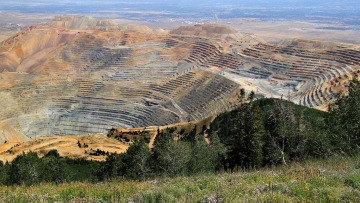Ahead of Rio Tinto AGM, new report highlights growing concerns to Serbian lithium mining plan
Bojana Novakovic: bojana@marssadrine.org or via Signal on +381643207700

Bojana Novakovic: bojana@marssadrine.org or via Signal on +381643207700
A new report published today by Marš sa Drine and BankTrack reveals mounting opposition to Rio Tinto’s controversial lithium mining project in Serbia, just ahead of the company’s Annual General Meeting (AGM). The report underscores significant risks facing the company as it continues to push forward with its Jadar Valley mine, processing center and landfill, amid growing public dissent, legal challenges, and environmental concerns.
The updated analysis, “Mining for Trouble: A Wake-Up Call for Banks and Investors” highlights the intensifying public opposition and social unrest that has only grown since the July 2024 Serbian Constitutional Court overturned a 2022 government decision that had annulled Rio’s initial planning permissions. This decision renewed tensions surrounding the mine, especially since the 2022 cancellation was made in response to unprecedented public opposition, leading many to view the court's decision as a political maneuver rather than a genuine legal reversal.
The report identifies crucial risks to Rio’s operations and broader financial implications for its investors, focusing on environmental, social, and governance (ESG) concerns, as well as political instability in Serbia. Key findings from the report include:
- Growing opposition and public dissent, with 60% of Serbians opposing the project.
- Environmental and social risks, including to key sources of drinking water.
- Credibility issues and questionable business practices, including criticism from the Faculty of Biology at the University of Belgrade about Rio Tinto’s use of its study.
- Reputation risks due to state repression and transparency, noting reports of state repression against activists, lack of transparency, and administrative irregularities.
Marš sa Drine recommends that stakeholders press Rio Tinto to abandon the project, given the increasingly volatile environment and the company’s failure to secure a legitimate social license to operate.
"The fact that Rio Tinto has twice submitted incomplete scoping requests shows they haven’t learned from their past mistakes. Our friends are being arrested without cause, our scientists are being disrespected and we are being labeled eco-terrorists, simply because we are protecting the most fertile land in Serbia from becoming an industrial site. Standing idly by and watching the criminalization of land protection is a terrible look for any company that claims to support a just green transition. This project must be abandoned if Rio Tinto hopes to preserve the integrity of its shareholders' investments and what’s left of its reputation,” says Jovana Amidžić of Marš sa Drine.


